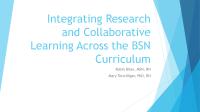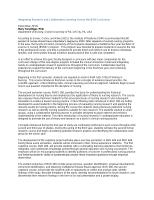| dc.description.abstract | Session presented on Friday, April 8, 2016: According to Sarver, Cichra, and Kline (2015), the Institute of Medicine (IOM) recommended that 80 percent of nurses should have a Bachelor's degree by 2020. After research of current nursing programs in the area, the faculty at Clarion University of Pennsylvania developed a traditional four year bachelor of science in nursing (BSN4Y) program. This program was intended to prepare students to assume the role of the professional nurse; one that is prepared to provide direct and indirect care to diverse individuals, families, and communities through evidence-based practice that is safe and competent. In an effort to achieve this goal, faculty designed a curriculum with two major components for the curriculum design of this new degree program included the clinical immersion model and integrating hands-on undergraduate research experiences throughout the curriculum. Collaborative learning experiences support the delivery of the curriculum beginning in the freshman year and continuing throughout the curriculum. Beginning in the first semester, students are required to enroll in NUR 160: Critical Thinking in Nursing. This course introduces freshman nurses to the concepts of evidence based practice, the scientific approach, critical thinking skills, clinical reasoning and clinical judgment. Students begin to learn how to ask question important to the discipline of nursing. The second semester course, NURS 180, provides the basis for understanding the historical development of nursing theory and emphasizes the application of theory to nursing research. The course also exposes these freshman students to the actual processes of nursing research and subsequent translation to evidence based nursing practice. Critical thinking skills introduced in NUR 160 are further developed to assist students in the beginning process of evaluating nursing research and applying the relevant results to nursing practice. During the course the students study previously published nursing research as well as identify nursing questions suitable for new research. The students worked in small groups, using a collaborative learning process in activities designed to pique interest and enhance understanding of the material. This early introduction of nursing research in undergraduate education is designed to promote the use of theory and research as a basis in clinical nursing practice. Concepts introduced during the first year of study are continually reinforced in each course throughout the second and third year of studies. During the spring of the third year, students will take the second formal research course and begin considering potential research projects and identifying the collaborative work group for the senior year. The development of the capstone project will take place over two semesters in NUR 465 and NUR 466. During these same semesters, students will be immersed in their clinical experience rotations. The first capstone course, NUR 465, will provide students with a culminating learning experience that reinforces, integrates, and synthesizes knowledge gained through general education and nursing coursework. The emphasis will be on encouraging students to identify questions of concern in professional nursing practice and fostering students' ability to systematically answer these important questions through empirical observation. The student outcomes of NUR 465 include group process, question identification, proposal development, instrument identification, and obtaining Institutional Review Board approval. NUR 466, the second capstone course, will provide the students with an opportunity to collect and analyze data, identify findings of the study, describe limitations of the study, develop recommendations for future research, and disseminate their research findings in the form of an oral presentation and a poster display. The first class of Clarion University of Pennsylvania BSN4Y students to cross the graduation platform will indeed be a 'different kind of nurse'. These nurses, having been educated in an program steeped in the process of evidence based practice built on theory based nursing research, are poised to take the nursing process into all aspects of health care as they exit nursing education and enter nursing practice. The collaborative learning model used throughout their nursing education will have equipped them to continue this collaborative process with contemporaries as they enter the work force or continue their own education. As leaders in the field of baccalaureate trained nurses, these students with a rich knowledge base of nursing research, are truly the future of nursing, continuing in Nightingale's tradition of taking the best of the past forward to the future. Sarver, W., Cichra, N., & Kline, M. (2015). Perceived benefits, motivators, and barriers to advancing nurse education: Removing barriers to improve success. Nursing Education Perspectives, 36(3), 153-156. doi: 10.5480/14-1407 | en |






